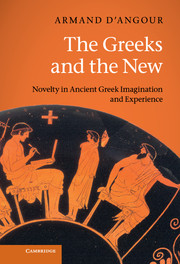Book contents
- Frontmatter
- Contents
- Acknowledgements
- Introduction
- Chapter 1 New, new, new
- Chapter 2 Loosening the grip of the past
- Chapter 3 The transformations of Kaineus
- Chapter 4 Old and new
- Chapter 5 Nothing new under the sun
- Chapter 6 The birth of Athena
- Chapter 7 Inventions of Eris
- Chapter 8 The newest song
- Chapter 9 Constructions of novelty
- Chapter 10 So what's new?
- References
- General index
- Index of Greek terms
- Index locorum
Chapter 4 - Old and new
Published online by Cambridge University Press: 07 September 2011
- Frontmatter
- Contents
- Acknowledgements
- Introduction
- Chapter 1 New, new, new
- Chapter 2 Loosening the grip of the past
- Chapter 3 The transformations of Kaineus
- Chapter 4 Old and new
- Chapter 5 Nothing new under the sun
- Chapter 6 The birth of Athena
- Chapter 7 Inventions of Eris
- Chapter 8 The newest song
- Chapter 9 Constructions of novelty
- Chapter 10 So what's new?
- References
- General index
- Index of Greek terms
- Index locorum
Summary
Ring out the old, ring in the new.
Alfred Lord TennysonThe aim of this chapter is to throw the notion of the new into sharper relief through consideration of its relationship to its antonym, ‘old’. The sense that old and new are opposite rather than complementary terms may seem self-evident in a post-industrial world, where the old is constantly superseded by the new, where new developments are invariably associated with progress, and where new styles and technologies readily adopted by the younger generation present a stark contrast to those familiar to the older. Some ancient equivalents of such technologisation – the introduction of writing, the spread of money, the development of specialised skills – may have aroused in Greek minds similar associations to ‘new’ and ‘old’; but the cultural context and far slower pace of technological change are bound to have affected the way the opposition operated. Below I shall consider the opposition with reference to a list of explicit oppositions preserved by Aristotle, the so-called Pythagorean Table. While this list does not include the terms ‘old’ and ‘new’ – an absence for which some explanation is sought – it provides a useful starting-point for thinking about the nature of opposition in general in Hellenic thought. In the remainder of the chapter I consider passages in Greek writings which show how the opposition of ‘old’ and ‘new’ functioned in different contexts, genres and environments.
What is new is not old, what is old is not new. While the habit of defining a quality through its negative relation to an opposite is universal, it occurs with particular insistence in Greek thought and discourse. Polarities and oppositions of various other kinds are regularly found in Greek texts, whether as unselfconscious patterns of speech or in quasi-formal attempts to articulate definitions. In due course, the underlying logic of binarism came to be formalised in Aristotle's ‘law of non-contradiction’ (A ≠ not-A). In practice, however, opposites (or notionally opposing qualities) have more complicated relations to each other than the simple negation of one by the other; and imagination and discourse can blur, whether unconsciously or with express intent, qualities, conditions or entities that are generally supposed to be mutually exclusive.
- Type
- Chapter
- Information
- The Greeks and the NewNovelty in Ancient Greek Imagination and Experience, pp. 85 - 107Publisher: Cambridge University PressPrint publication year: 2011



